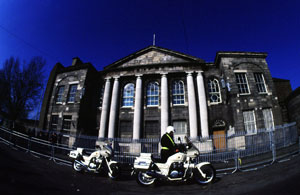31 May 2007 Edition
Remembering the Past

Special ‘Criminal’ Court
The Special ‘Criminal’ Court in Dublin, established on 31 May 1972, has been used for the past 35 years to railroad hundreds of republican activists into jail on trumped up charges without the benefit of a jury or credible evidence. For three-and-a-half decades the Green Street court has opereated basically as a 26 County version of the North’s Diplock courts.
For many decades, the Southern state has relied on special courts, military tribunals and draconian legislation in its attempt to crush the Republican Movement. In 1936, de Valera’s Fianna Fáil government introduced special courts to imprison republicans and three years later, in August 1939, during the IRA’s campaign in England, established special military tribunals which were empowered to return only one sentence – the death sentence – from which there was no appeal.
During the early 1940s, hundreds of republicans were interned and sentenced to long periods of imprisonment by special courts. Six IRA Volunteers – Paddy McGrath, Thomas Harte, Richie Goss, George Plant, Maurice O’Neill and Charlie Kerins – were tried by military tribunals, found guilty and executed.
With the outbreak of conflict in the Six Counties and the upsurge in support for the republican struggle, the 26 County government, under Jack Lynch, invoked Part Five of the Offences Against the State Act 1939 and in May 1972 set up the Special Criminal Court in Green Street in Dublin, the venue of many famous trials during the years 1798 to 1883.
The reason given by Des O’Malley, the then Fianna Fáil Justice Minister, for establishing the no jury Special Court was that jurors were being intimidated. When pressed to produce evidence of this, he failed to cite one example where it had happened.
One of the most outspoken critics of the establishment of the Special Court at one stage was Paddy Cooney, who declared “There is a limit to the measures a democracy is entitled to adapt in order to protect itself.” During the following years however, Cooney, as Justice Minister in the Fine Gael/Labour Coalition government, was to introduce some of the most repressive legislation since the Cumann na nGaedheal era of the 1920s.
Thousands of republicans have appeared before the Special Criminal Court since its establishment in 1972, 75% of whom have been convicted and sentenced to terms of imprisonment in Portlaoise, Limerick and Mountjoy jails.
What was in theory, to be a temporary use of the emergency legislation was, in practice, the setting up of a permanent jury-less court. Although the Special Criminal Court was introduced to smash the republican struggle, the past 35 years and the current strength of republicanism throughout Ireland clearly demonstrates its failure.
With the IRA cessation, the Good Friday Agreement and a new political dispensation in the North, many people believed that the Special Court would be abolished, and the Offences Against the State Acts which allow for its use would be scrapped. But the current government has failed to do so and instead has defended its continued existence. New provisions to the Offences Against the State Acts, introduced in 1998, were renewed by the Dáil only last month.
The draconian nature of the Offences Against the State Acts (OASA) and the Special Court, was demonstrated recently by the conviction of Cork man Don Bullman for IRA membership purely on the word of a Garda and by the four year sentence imposed upon him.
Following last week’s general election, the incoming Irish Government, whatever its composition, has a serious responsibility to live up to its obligations under the Good Friday Agreement to deliver security normalisation. Scrapping the Offences Against the State Acts and abolishing the Special Court is an indispensable part of this. The Special Court has no place in the future of Ireland.
The Special ‘Criminal’ Court was established on 31 May 1972, 35 years ago this week.


